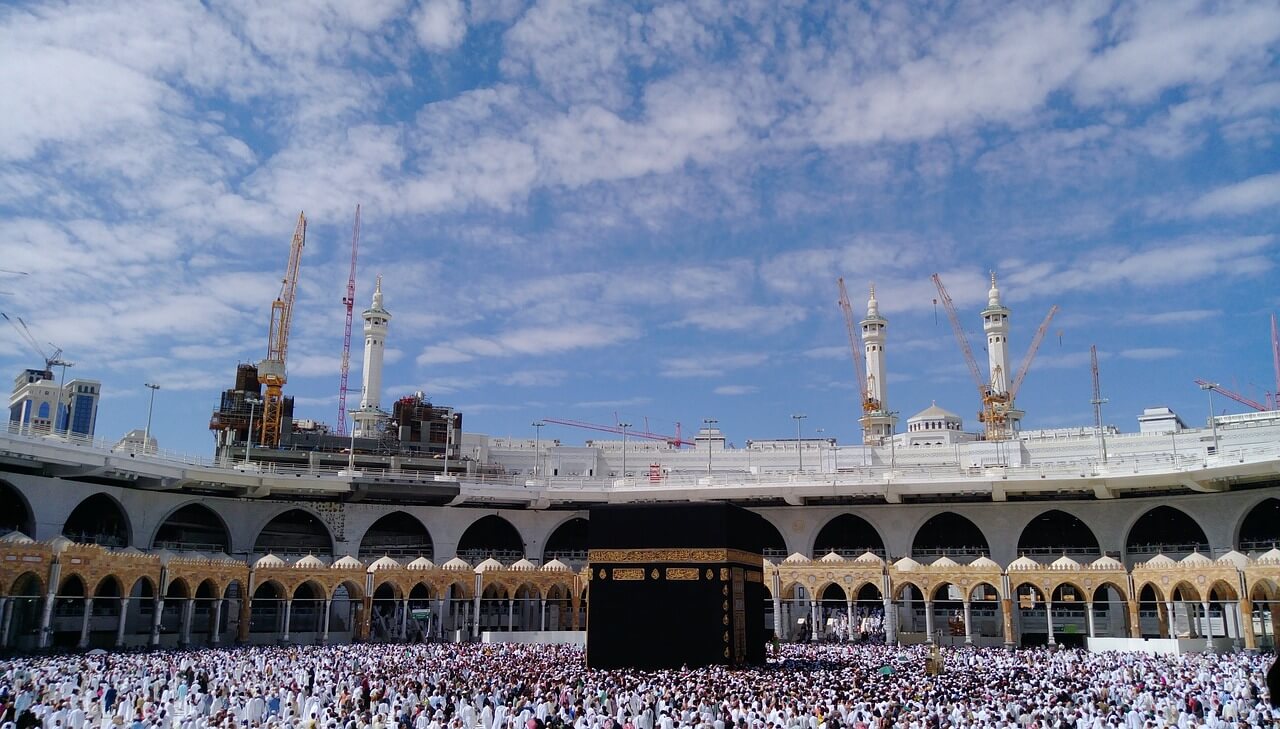
The Kaaba, located in the holy city of Mecca, holds immense significance in Islam and is revered as the most sacred site in the religion. Muslims from around the world face towards the Kaaba during their daily prayers, symbolizing unity and devotion to Allah. This ancient structure, draped in a black cloth, known as the Kiswa, is steeped in history and spiritual symbolism. From its origins to the rituals associated with it, the Kaaba continues to captivate the hearts and minds of millions of believers.
In this article, we will delve into 18 fascinating facts about the Kaaba, shedding light on its historical, religious, and cultural importance. Whether you are seeking to deepen your understanding of Islam or simply intrigued by this iconic structure, these insights will offer a compelling glimpse into the rich tapestry of the Kaaba's legacy. Let's embark on a journey to unravel the mysteries and marvels surrounding this ancient edifice.
Key Takeaways:
- The Kaaba in Mecca is a sacred site for Muslims, symbolizing unity and the oneness of God. It holds deep religious significance and serves as a beacon of hope and spiritual renewal for believers worldwide.
- The Kaaba’s enduring legacy as a symbol of faith, devotion, and unity transcends time and space, drawing millions of Muslims to its sacred precincts. It symbolizes divine mercy, forgiveness, and the unwavering faith of Prophet Ibrahim and his son Isma’il.
The Kaaba is a sacred structure located in the center of the Great Mosque in Mecca.
The Kaaba, also spelled as Ka'bah, is a cuboid-shaped building at the center of Islam's most sacred mosque, Al-Masjid al-Haram, in Mecca, Saudi Arabia. Muslims around the world face the Kaaba during their daily prayers (Salah). It is considered the most sacred site in Islam and holds immense religious significance for Muslims worldwide.
The Kaaba is draped in a black silk cloth embroidered with Quranic verses in gold and silver thread.
The Kaaba is adorned with a black silk cloth known as the kiswah, which is intricately embroidered with verses from the Quran using gold and silver threads. This cloth is replaced annually during the Hajj pilgrimage and is considered a great honor for the country responsible for its production.
The Kaaba is often referred to as the "House of Allah."
The Kaaba is commonly referred to as Baitullah, which translates to the "House of Allah" in Arabic. It is believed to be the first house of worship built for the worship of one God.
The Kaaba predates the advent of Islam.
The origins of the Kaaba can be traced back to the time of Prophet Ibrahim (Abraham), who, along with his son Isma'il (Ishmael), is believed to have constructed the Kaaba as a sanctuary for the worship of the One True God.
The Kaaba is the focal point of Muslim prayer and pilgrimage.
Muslims face the Kaaba in Mecca when performing their daily prayers, no matter where they are in the world. Additionally, millions of Muslims from around the globe converge upon the Kaaba during the annual Hajj pilgrimage, fulfilling one of the Five Pillars of Islam.
The Black Stone is embedded in the eastern corner of the Kaaba.
The Kaaba houses the Black Stone, a revered Islamic relic believed to have been given to Prophet Ibrahim by the angel Jibril (Gabriel). Pilgrims seek to kiss or touch the Black Stone as a part of the Tawaf ritual during Hajj and Umrah pilgrimages.
The Kaaba has been reconstructed several times throughout history.
The Kaaba has undergone multiple reconstructions and renovations over the centuries. The most recent major reconstruction was undertaken in 1996, expanding the mosque and providing more space for worshippers.
The Hateem is a semi-circular area adjacent to the Kaaba.
The Hateem is a low wall originally part of the Kaaba but is now considered a separate part of the structure. It is also known as the Hijr Ismail and is believed to be the burial place of Hagar and Isma'il.
The Kaaba's interior is empty.
While the exterior of the Kaaba is adorned with the kiswah and calligraphy, its interior is stark and unadorned. It is reported that the only items inside are three pillars and some lamps.
The Kaaba is considered the "House of Allah" by Muslims.
The Kaaba is a symbol of unity for Muslims, as it is the focal point towards which they direct their prayers. It serves as a physical manifestation of the Islamic faith's emphasis on the oneness of God.
The Kaaba is a symbol of the oneness of God.
The Kaaba represents the unity and oneness of Allah in Islam. It serves as a powerful symbol of the Islamic faith's central belief in the absolute oneness of God.
The Kaaba is a site for pilgrimage and spiritual renewal.
Muslims from around the world travel to the Kaaba to perform the Hajj pilgrimage, seeking spiritual purification and a renewed sense of faith. The experience of circumambulating the Kaaba during Tawaf is deeply symbolic and spiritually uplifting for pilgrims.
The Kaaba is a focal point for Islamic unity.
The Kaaba's significance extends beyond its physical structure; it symbolizes the unity of the global Muslim community. Muslims from diverse backgrounds and cultures come together at the Kaaba, reinforcing their shared faith and brotherhood.
The Kaaba is a testament to the enduring legacy of Prophet Ibrahim.
The story of Prophet Ibrahim and his son Isma'il's construction of the Kaaba is a testament to unwavering faith and submission to the will of Allah. The Kaaba stands as a reminder of their devotion and serves as a source of inspiration for Muslims worldwide.
The Kaaba is a beacon of hope and spiritual aspiration.
For Muslims, the Kaaba represents a spiritual focal point and a symbol of divine guidance. It embodies the aspirations of believers who seek closeness to Allah and spiritual fulfillment through their devotion and worship.
The Kaaba is a source of spiritual nourishment for Muslims.
The Kaaba serves as a spiritual compass, guiding Muslims in their daily prayers and drawing them closer to the divine presence. Its significance as a place of worship and spiritual nourishment is unparalleled in the Islamic faith.
The Kaaba is a symbol of divine mercy and forgiveness.
The Kaaba is revered as a site of divine mercy and forgiveness, where believers seek solace and pardon for their sins. It symbolizes the boundless compassion and grace of Allah, offering hope and redemption to all who turn to Him in sincere repentance.
The Kaaba is a timeless symbol of faith, devotion, and unity.
The Kaaba's enduring presence and profound significance make it a timeless symbol of unwavering faith, steadfast devotion, and the unity of the global Muslim community. Its sacred aura continues to inspire and uplift the hearts of believers, transcending time and space.
The Kaaba stands as a timeless symbol of faith, unity, and spiritual aspiration, drawing millions of Muslims from around the world to its sacred precincts. Its profound significance as the focal point of Islamic worship and pilgrimage underscores its enduring legacy as a symbol of divine mercy, forgiveness, and unity for the global Muslim community. The Kaaba's rich history, rooted in the traditions of Prophet Ibrahim and his son Isma'il, serves as a powerful reminder of unwavering faith and submission to the divine will. As the spiritual nucleus of Islam, the Kaaba embodies the oneness of Allah and serves as a source of spiritual nourishment, hope, and renewal for believers who seek closeness to the divine presence. The timeless allure of the Kaaba transcends generations, uniting Muslims in their shared devotion and faith, and standing as a beacon of divine mercy and forgiveness for all who turn to it in reverence and humility.
Conclusion
The Kaaba is a symbol of unity, spirituality, and devotion for Muslims around the world. Its rich history, religious significance, and architectural marvel continue to inspire awe and reverence. As the focal point of Islamic pilgrimage and a testament to the faith of millions, the Kaaba stands as a timeless testament to the enduring power of religious devotion and the unity of believers from diverse backgrounds.
FAQs
What is the significance of the Kaaba in Islam?The Kaaba is considered the most sacred site in Islam, as it is the direction towards which Muslims pray and the focal point of the Hajj pilgrimage. It holds immense religious and historical significance as the House of God built by Prophet Ibrahim and his son Isma'il.
How old is the Kaaba?The exact age of the Kaaba is uncertain, but it is believed to have been built thousands of years ago. Islamic tradition holds that the Kaaba was first constructed by Prophet Ibrahim and his son Isma'il as a place of worship for the one true God.
Was this page helpful?
Our commitment to delivering trustworthy and engaging content is at the heart of what we do. Each fact on our site is contributed by real users like you, bringing a wealth of diverse insights and information. To ensure the highest standards of accuracy and reliability, our dedicated editors meticulously review each submission. This process guarantees that the facts we share are not only fascinating but also credible. Trust in our commitment to quality and authenticity as you explore and learn with us.


